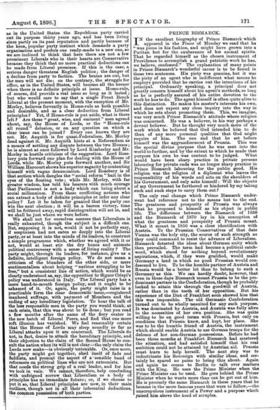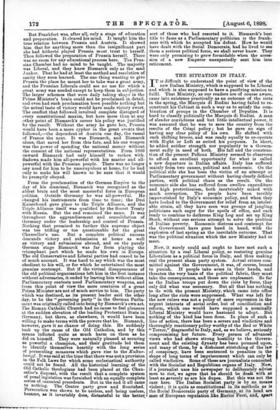PRINCE BISMARCK.
IN the excellent biography of Prince Bismarck which appeared in the Times of Monday we read that he "was pious in his fashion, and might have grown into a Puritan but for the exuberance of his animal spirits. That he regarded himself as the chosen instrument of Providence to accomplish a grand patriotic work he has, we believe, confessed." The explanation of many points in Prince Bismarck's wonderful career is to be found in these two sentences. His piety was genuine, but it was the piety of an agent who is indifferent what means he employs provided that he carries out the intentions of his principal. Ordinarily speaking, a principal does not greatly concern himself about his agent's methods, so long as he is perfectly assured of his entire devotion to the work he has to do. The agent himself is often quite alive to this distinction. He makes his master's interests his own, and does not expect any close inquiry into the way in which he sets about promoting them. This, we imagine, was very much Prince Bismarck's attitude where religion was concerned. He was a believer, in his way perhaps a devout believer. But he thought very much more of the work which he believed that God intended him to do than of any more personal qualities that God might require of him. The one end that he set before himself was the aggrandisement of Prussia. This was the special divine purpose that he was sent into the world to further, and by the extent to which he made that purpose his own he was content to be judged. What would have been sharp practice in private persons labouring for private ends was no longer sharp practice in Prince Bismarck labouring for the public good. His religion was the religion of a diplomat who leaves the responsibility of his words and acts on the shoulders of his Government, and only asks himself : Will the objects of my Government be furthered or hindered by my taking such and such steps to carry them out ?
The only real change which Prince Bismarck under- went had reference not to the means but to the end. The greatness and prosperity of Prussia was always what he proposed to himself as his object in public life. The difference between the Bismarck of 1850 and the Bismarck of 1870 lay in his conception of what the greatness and prosperity of Prussia meant. What it meant in 1850 was a, close identification with Austria. To the Prussian Conservatives of that date Vienna was the holy city, the source of such strength as they could command to resist the advance of Liberalism. Bismarck detested the ideas about German unity which then prevailed. The term had become a political catch- word, which stood for nothing beyond revolutionary aspirations, which, if they were gratified, would make ,Germany a land in which no good Prussian would con- descend to live. To be the humble partner of Austria and Russia would be a 'better lot than to belong to such a ,Germany as this. We can hardly doubt, however, that even in these days Bismarck meant Prnssia to be the pre- dominant partner in the Confederation, though he probably looked to attain this through the goodwill of Austria, rather than in the teeth of her opposition. But his experience of the Diet of Frankfort soon showed him that this was impossible. The old Germanic Confederation turned out to be wholly unsuited for any such purpose. It was dominated by Austria, and. Austria was fully alive to the necessities of her own position. She was quite willing to be on good terms with Prussia, but only on condition that Prussia knew, and. kept, her place. She was to be the humble friend of Austria, the instrument which should enable Austria to use German troops for the defence of her non-German possessions. Before he had been three months at Frankfort Bismarck had mastered the situation, and had satisfied himself that his real ambition could not be attained by Austrian aid. Prussia must learn to help herself. The next step was to indoctrinate his Sovereign with similar ideas, and cer- tainly he spared no pains to bring this about. Again and again be comes to Berlin to talk over matters with the King. He uses the Prime Minister when the Prime Minister can be used. He goes behind the Prime Minister when he wants more than can be got out of him. He is precisely the same Bismarck in these years that he became in the more famous years that were to follow,—the unscrupulous instrument of a Power and a purpose which raised him above the heed of scruples. But Frankfort was, after all, only a stage of education and preparation. It cleared his mind. It taught him the true relation between Prussia and Austria. It showed him that for anything more than the insignificant part she had hitherto played Prussia must trust to herself. Then followed the preparation of Prussia herself. There was no room for any educational process here. The Prus- sian Chamber had no mind to be taught. The majority was Liberal, and they knew Bismarck only as the mad Junker. That he had at least the method and resolution of sanity they soon learned. The one thing wanting to give Prussia the place he meant her to take was a great army, and the Prussian Liberals could see no use for which a great army was needed except to keep them in subjection. The larger schemes that were daily taking shape in the Prime Minister's brain could not be proclaimed in detail, and even had such proclamation been possible nothing but the actual taste of victory would have made victory sweet. The conflict that followed involved complete disregard of every constitutional maxim, but here more than at any other point of Bismarck's career his policy was justified by the result. Without the army he gave her, Prussia would have been a mere cypher in the great events that followed,—the dependent of Austria one day, the vassal of France the next. It was Bismarck, and Bismarck alone, that saved her from this fate, and his one weapon was the power of spending the national money without the consent of the national representatives. From 1866 onward Bismarck had only himself to reckon with. Sadowa made him all-powerful with his master and all- powerful with the Prussian people. There was no longer any need for him to be unscrupulous at home, for he had only to make his will known to be sure that it would be promptly obeyed.
From the proclamation of the German Empire to the day of his dismissal, Bismarck was recognised as the ablest brain and the most masterful force in European politics. Outside Germany he was all-powerful. He changed his instruments from time to time ; the Drei Kaiserbund gave place to the Triple Alliance, and the Triple Alliance itself was qualified by the Secret Treaty with Russia. But the end remained the same. It was throughout the aggrandisement and consolidation of Germany under the leadership and control of Prussia. Nothing that promised to further this supreme object was too trifling or too questionable for the great Chancellor's use. But a complete political success demands victory and submission at home as well as victory and submission abroad, and on the purely German stage Bismarck was far from playing the triumphant part which he made his own in Europe. The old Conservative and Liberal parties had ceased to be of much account. It was hard to say which was the most obedient to his will, or for which he entertained the most genuine contempt. But if the virtual disappearance of the old political organisations left him in the first instance without adversaries, it ended by leaving him without allies. Parliamentary contests need Parliamentary weapons, and from this point of view the mere creatures of a great Prime Minister are not of much service to him. The party which was destined, as its present leader said the other day, to be the "governing party" in the German Parlia- ment was originally called into being by Bismarck's own act. The Roman Catholic Church had no cause to feel pleasure at the sudden elevation of the leading Protestant State in Germany, but there, as elsewhere, it would have been willing to make terms with the powers that be. Bismarck, however, gave it no chance of doing this. He suddenly took up the cause of the Old Catholics, and by this means inflicted quite as much harm on them as he did on himself. They were naturally pleased at securing so powerful a champion, and their gratitude led them to identify themselves heartily with the long series of persecuting measures which gave rise to the Kultur- kanig. It was said at the time that there was not a provision in the Falk Laws for which some ecclesiastical authority could not be found. All the historical learning of the Old Catholic theologians had been placed at the Chan- cellor's disposal, with the result that a complete system of penal legislation was furnished with an equally complete series of canonical precedents. But in the end it all came to nothing. The Centre party grew and flourished. Persecution was shown to be useless, and being useless, became, as it invariably does, distasteful to the better, sort of those who had resorted to it. Bisniarck's beat title to fame as a Parliamentary politician is the frank- ness with which he accepted his defeat. How he would have dealt with the Social Democrats, had he lived to see them a serious political force, we shall never know. They were only promising to grow formidable when the acces- sion of a new Emperor unexpectedly sent him into retirement.



































 Previous page
Previous page